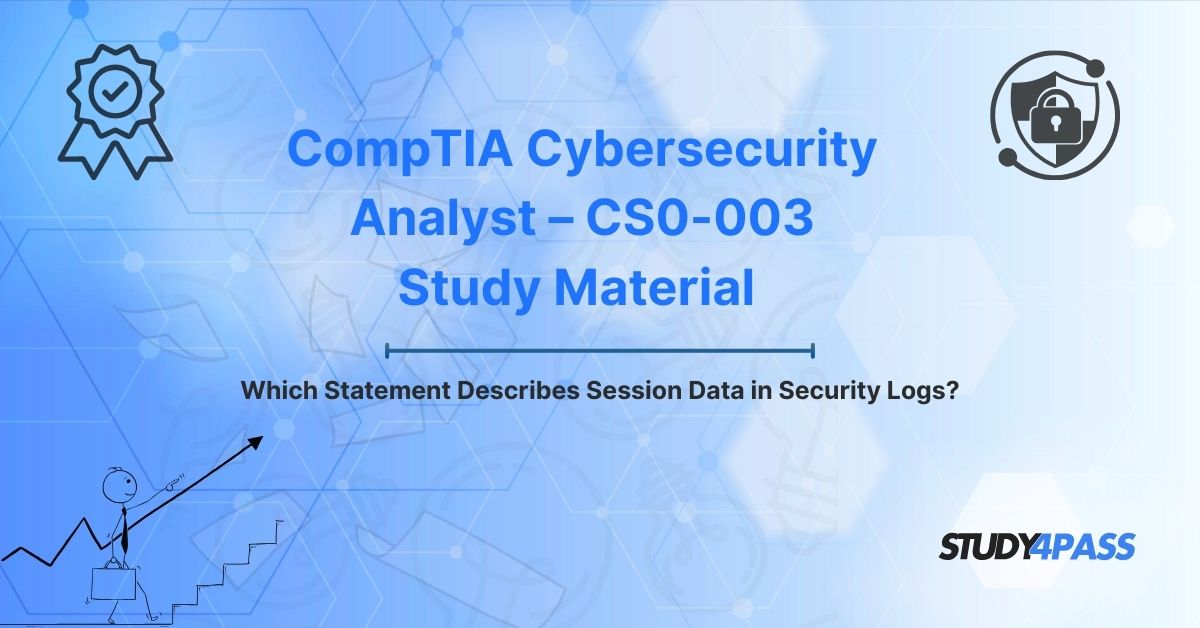In the pulsing heart of cybersecurity, where every digital footprint tells a story of trust or treachery, security logs stand as the silent chroniclers of truth. For those honing their craft in the CompTIA Cybersecurity Analyst (CySA+) – CS0-003 Exam, a question rises like a beacon through the data fog: Which statement describes session data in security logs? The answer session data records details about user connections, such as start time, duration, and endpoints unlocks a critical piece of the analyst’s arsenal. This article weaves an intricate saga of session data’s role, spotlighting how Study4Pass sharpens your blade to master the CS0-003 and claim your place as a cybersecurity sentinel.
CompTIA Cybersecurity Analyst - CS0-003 Certification: Introduction to Cybersecurity Analysis
Security logs are the lifeblood of cybersecurity analysis digital scrolls capturing events, from login attempts to malware pings. They fuel threat detection, incident response, and compliance audits, making them indispensable in a world where breaches cost billions annually. For the CS0-003, logs are a core focus, and Study4Pass illuminates their secrets.
Launched in June 2023, the CS0-003 is CompTIA’s mid-level crucible for cybersecurity analysts a 85-question, 165-minute gauntlet spanning threat management, security operations, incident response, and reporting. It’s hands-on, with labs testing log parsing and SIEM mastery, preparing you for SOC roles ($80,000-$110,000 annually). Session data, a log’s vital thread, glints within its scope.
This article answers the question Which statement describes session data in security logs? while forging a path through CS0-003’s terrain, showcasing Study4Pass as your master armorer with tailored study materials and exam prep practice test.
Understanding Security Logs
Security logs are records of system and network events timestamps, IPs, user actions generated by firewalls, SIEMs, servers, and endpoints. Think Windows Event Logs or Splunk outputs, cataloging everything from failed logins to file access.
Logs are the analyst’s lens:
- Threat Detection: Spot anomalies e.g., brute-force spikes.
- Incident Response: Trace breaches e.g., ransomware’s path.
- Compliance: Prove adherence e.g., HIPAA, PCI-DSS.
Among logs’ threads, session data tracks user connections vital for auditing access or spotting intruders. Study4Pass sharpens this focus for CySA+ Exam.
The Definitive Statement: Session Data Description
The statement that describes session data in security logs is: Session data records details about user connections, such as start time, duration, and endpoints. It captures the who, when, and where of network sessions e.g., a user logging into a VPN from 192.168.1.10 at 09:00 for 30 minutes. This clarity fuels threat hunting and forensics, a CS0-003 cornerstone Study4Pass unveils.
Anatomy of Session Data
Session data’s structure is a tracker’s map:
- User ID: Who connected e.g., “jdoe.”
- Start Time: When e.g., “2025-04-14 09:00:23.”
- Duration: How long e.g., “1800 seconds.”
- Endpoints: Source/destination e.g., “192.168.1.10 to 10.0.0.1.”
- Protocol: How e.g., TCP, UDP.
- Port: Service e.g., 3389 (RDP).
In a SIEM, session data might show “jdoe RDP’d to server01 for 2 hours” a clue to a breach if jdoe’s off-duty. Study4Pass dissects this for CS0-003.
CS0-003 Study Materials: Session Data Focus
Session data glints in CS0-003:
- Security Operations (30%): Parse logs for session anomalies.
- Incident Response (22%): Trace unauthorized sessions.
- Reporting (26%): Summarize session risks for execs.
Study4Pass stocks your quiver:
- Guides: Session data’s role in logs.
- Labs: Parse Splunk outputs spot rogue RDP.
- Exam Prep Practice Tests: “What’s session data?” scenarios.
Real-World Application
Session data saves:
- Insider Threat: A 2024 SOC used session logs to catch an ex-employee’s VPN login blocked post-haste.
- Ransomware Trace: Session data showed a 3 a.m. SMB session malware’s footprint, stopped cold.
- Audit Win: A hospital’s session logs proved HIPAA compliance user access audited.
In a bank, session data flagged a 10-hour RDP from abroad Study4Pass grounds these in CS0-003.
Comparison with Other Log Data
Session data faces log kin:
- Authentication Logs: Track login attempts e.g., “jdoe failed 5 times.”
- System Logs: Record OS events e.g., “service crashed.”
- Network Logs: Capture traffic e.g., “10MB to 8.8.8.8.”
| Log Type | Focus | User-Centric? | Connection Details? |
| Session | Connections | Yes | Yes |
| Authentication | Logins | Yes | No |
| System | OS events | No | No |
| Network | Traffic flows | Partial | Partial |
Session data’s connection clarity shines Study4Pass sharpens this for CS0-003.
Preparing for CS0-003: Strategic Approach
Mastering CS0-003 demands a tracker’s plan:
- Know Logs: Study session data’s anatomy.
- Use Study4Pass: Tap guides, labs, exam prep practice test.
- Simulate: Parse mock logs e.g., Splunk, Wireshark.
- Time It: Practice 1-2 minutes per question.
- Refine: Study4Pass analytics target gaps e.g., session vs. auth logs.
With Study4Pass, you’re a CS0-003 log master.
Final Verdict
Session data records details about user connections, such as start time, duration, and endpoints a CS0-003 truth. It’s the log’s pulse, guiding analysts to threats. Session data mastery unlocks SOC prowess, compliance wins, and incident clarity core to CySA+. Pass CS0-003, then aim higher CISSP, CISM or deepen with CEH. Study4Pass lights the trail.
Special Discount: Offer Valid For Limited Time “CS0-003 Exam Prep Materials”
Sample Exam Questions from CompTIA Cybersecurity Analyst - CS0-003 Certification Exam Prep Practice Test
Which statement describes session data in security logs?
A) Tracks hardware failures
B) Records user connections, start time, duration
C) Lists firewall rules
D) Captures OS updates
In CS0-003, what’s a session data field?
A) CPU usage
B) Endpoint IP
C) Disk space
D) Patch version
What’s a real-world CS0-003 session data use?
A) Speeding networks
B) Spotting rogue VPN logins
C) Encrypting files
D) Routing traffic
How does session data differ from system logs in CS0-003?
A) Tracks connections
B) Records crashes
C) Lists patches
D) Captures routes
In a CS0-003 scenario, what limits session data?
A) Tracks all events
B) Misses non-login attacks
C) Slows SIEMs
D) Encrypts logs


